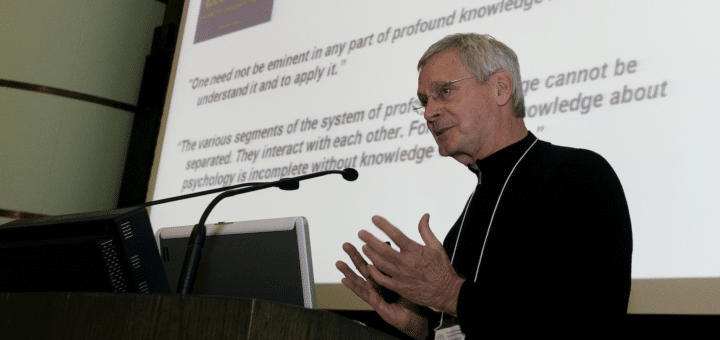THE DEMING INSTITUTE BLOG
| Customer Focus, Deming Philosophy, Dr. Deming, systems thinking
The consumer is the most important point on the production-line
By John Hunter, author of the Curious Cat Management Improvement Blog. In, New Principles in Administration for Quality and Efficiency (speech by W. Edward Deming in Manila, Philippines, July 2, 1971) Dr. Deming laid out 19 principles. The full list of principles is included in The Essential Deming, page 176-178. Two I find particularly insightful […]
| data, Deming Philosophy, Theory of Knowledge, Understanding Variation
Ron Moen Webcast: Prediction is the Problem
By John Hunter, founder of CuriousCat.com. Prediction is the Problem, Ron Moen’s presentation at the 2012 Annual Deming Conference. “Planning requires prediction. Prediction requires a theory.” In the video Ron Moen talks about the Associates for Process Improvement model for improvement. The enhanced PDSA cycle includes an explicit focus on prediction in the planing phase […]
| Appreciation for a System, Deming Philosophy, Dr. Deming, Understanding Variation
What to Do When Individual Performance is Exceptional (outside normal variation)
By John Hunter, author of the Curious Cat Management Improvement Blog. W. Edwards Deming wrote that most of the results are due to the system and blaming people for those results was not effective. He also wrote that sometimes employees were outside control limits (evidence of a special cause existed). When those employees were failing […]
| data
Unknown and Unknowable Data
Guest post by John Hunter, founder of the CuriousCat.com. From Out of the Crisis, page 121: the most important figures that one needs for management are unknown or unknowable (Lloyd S. Nelson, director of statistical methods for the Nashua corporation), but successful management must nevertheless take account of them. We need to manage systems even […]
| Deming Community, Events and Outreach, Psychology, respect for people
Peter Scholtes on Managing People and Motivation
By John Hunter, author of Management Matters: Building Enterprise Capability. Peter Scholtes on understanding people and why they behave as they do; from his presentation at the 2008 Deming Institute conference in Madison, Wisconsin. In the presentation he discussed the 6 leadership competencies from his book, The Leader’s Handbook, which is based on Deming’s ideas […]
| Customer Focus, Deming Philosophy, systems thinking
Fewer Patients-In-Process and Less Safety Scheduling; Incoming Supplies are Secondary
Guest Post by Sami Bahri As a way to improve operations, manufacturers reduce inventory levels at all steps in a value stream. Taiichi Ohno, inventor of the “Toyota production System,” said that inventory conceals operational waste the same way water in a lake hides underlying rocks. Ohno advised reducing inventory levels to uncover waste. In […]
| Deming Community, Events and Outreach, The W. Edwards Deming Institute
Out of the Crisis – New Thinking for a Sustainable World Conference, October 18-20, 2013
By John Hunter, founder of CuriousCat.com. The W. Edwards Deming Institute® and Purdue University present a weekend conference sharing the ideas of Dr. Deming and their connection to the critical concept of sustainability. Out of the Crisis – New Thinking for a Sustainable World October 18-20, 2013 This energizing and interactive conference will provide an […]
| Psychology, systems thinking
Do We Need to Find Management Ideas from Our Industry?
By John Hunter, author of Management Matters: Building Enterprise Capability. Quite often, people are concerned that our industry isn’t the same as some example. And often, this leads to concerns that we can’t use the ideas. Deming’s management system is not prescriptive. There isn’t a recipe for how to implement the ideas in your organization. […]
| Customer Focus, Deming Philosophy
Profit and growth come from customers that boast about your products and services
By John Hunter, founder of CuriousCat.com. Satisfied customers switch, for no good reason, just to try something else. Why not? Profit and growth come from customers that boast about your product and service – the loyal customer. He requires no advertising or other persuasion, and brings a friend along with him. Dr. W. Edwards Deming […]
| Appreciation for a System, Deming Philosophy, Deming Today, Education, Theory of Knowledge
Attributing Fault to the Person Without Considering the System
By John Hunter, author of the Curious Cat Management Improvement Blog. Fundamental attribution error: attribute fault or defect to the individual without first considering the systemic effect. When we fall into this trap the system is not improved. What we want to do is when we find poor results is think about how the system […]




